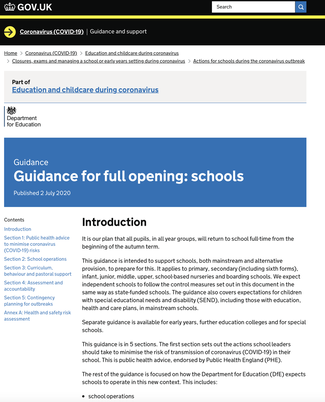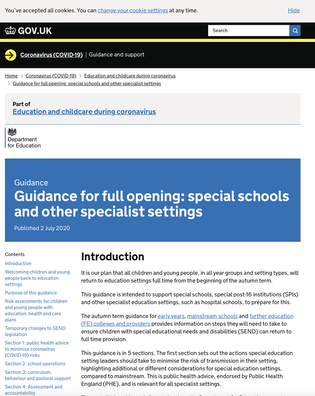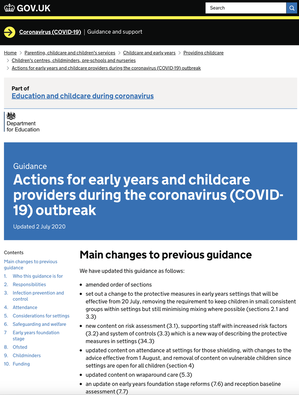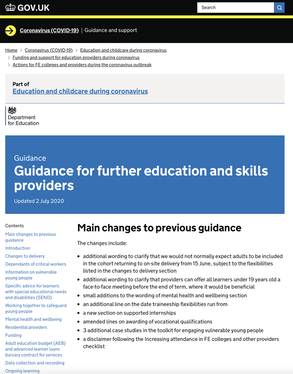|
by Douglas Silas, specialist SEN solicitor Here is my update for this week. There has been a lot of Government guidance issued this week, so just in case you missed any, I am going to set them out again below. I hope that this helps people again. 1. What has happened this week? The first bit of guidance that I want to draw you attention to is the one entitled: ‘Guidance for full opening: schools’. It said that it is guidance that applies to all schools in England and is to apply from the start of the autumn term and that it has been published before the start of the new academic year to help people prepare and says… READ MORE The next bit of guidance that I want to refer to is the one entitled: ‘Guidance for full opening: special schools and other specialist settings’, which said that it is the Government’s plan that all children and young people, in all year groups and setting types, will return to education settings full time from the beginning of the autumn term. The guidance says that it is intended to support special schools, special post-16 institutions (SPIs) and other specialist education settings, such as hospital schools, to prepare for this and says… READ MORE The third bit of guidance that I want to highlight is the one entitled: ‘Actions for early years and childcare providers during the coronavirus (COVID-19) outbreak’, which was first issued in March, but was updated this week. It says that it is guidance for providers registered with Ofsted and childminders registered with childminder agencies for children of all ages and says… READ MORE The final bit of guidance that I want to bring to you attention to is the one entitled: ‘Guidance for further education and skills providers’, which was also first issued in March, but also updated this week. It says that it is guidance for further education (FE) providers on maintaining education and skills training, changes to funding arrangements, data collections and assessment and says… READ MORE 2. What does all of this mean? The best summary that I have found of everything is on the Council for Disabled Children’s website entitled: ‘Department for Education publishes new guidance for schools and other educational settings in September’, which says: ‘Today the Department for Education has published detailed guidance to support schools and colleges to fully reopen in September and early years and childcare providers from 20 July. At a press conference this afternoon, the Education Secretary, Gavin Williamson announced:
This means all children are expected back in school, full time from September and all provision for SEND should be in place. Risk assessments for children and young people with education, health and care plans will remain in place. The government published ‘Guidance for full opening: special schools and other specialist settings’. Below is an extract: “Following the partial closure of educational and childcare settings from 20 March 2020, we asked local authorities to consider the needs of all children and young people with an EHC plan and to carry out a risk assessment. Local authorities were asked to work with education settings and parents or carers to determine whether children and young people would be able to have their needs met at home and be safer there than attending an education setting. Risk assessments may prove useful now and over the autumn term, in identifying what additional support children and young people with EHC plans need to make a successful return to full education. Risk assessments may also prove useful if children and young people have to self-isolate, or if a local outbreak of coronavirus (COVID-19) requires a setting to return to more limited attendance, or temporarily close. Whether individual risk assessments are used to help plan for the autumn term or not, education settings should, in the spirit of coproduction, contact parents and involve them in planning for their child’s return to their setting from September. They should also contact and involve young people over 16 who have EHC plans. That might include visits to the setting, social stories, and other approaches that specialist settings normally use to enable a child or young person with SEND, who has spent some time out of education, to return to full provision.” The usual rules on school attendance will apply, including:
The only pupils who are exempt are those who are unable to attend school because they are complying with clinical and/or public health advice. In that case, schools will be expected to be able to immediately offer access to remote education. Schools are also required to ‘monitor engagement with this activity’. In regards to the temporary changes to SEND legislation where local authorities and health commissioners were required to use ‘reasonable endeavours’ to secure or arrange provisions for a child’s EHC this is expected to cease on July 31st and the absolute duty to provide back in place.’ I should probably also amplify on the last point, as the relevant guidance fully states: ‘Temporary changes to SEND legislation Since May, as a result of the outbreak, it has been necessary to modify Section 42 of the Children and Families Act 2014 so that local authorities and health commissioners must use their ‘reasonable endeavours’ to secure or arrange the specified special educational/ health care provision in EHC plans. We are committed to removing these flexibilities as soon as possible so that children and young people can receive the support they need to return to school. As such, unless the evidence changes, we will not be issuing further national notices to modify the EHC duties, but will consider whether any such flexibilities may be required locally to respond to outbreaks. We will also continue to monitor the need for the temporary changes to the law on EHC needs assessments and plans that give local authorities and others who contribute to the relevant processes more flexibility in responding to the demands placed on them by coronavirus (COVID-19). These changes are currently in force until 25 September. We remain committed to listening to and working with local authorities, parent carer representatives and specialist SEND organisations, to ensure that the lifting of the temporary changes is managed in a way that supports the needs of children and young people with SEND. All education settings have a statutory duty under equalities legislation to make reasonable adjustments for disabled children. Many children and young people will have found lockdown exceptionally difficult socially and emotionally. Settings should consider any challenging behaviours or social or emotional challenges arising as a response to the lockdown and offer additional support and phased returns where needed.’ 3. Where can I find further information?
Aside from clicking on the relevant links for more information, I would again remind you of the very useful resources and information provided on the following websites: - IPSEA - Council for Disabled Children - Contact - Scope - Special Needs Jungle I would also highlight again the fact that you can now get digital copies of the magazines: SEN Magazine and Autism Eye which are both very helpful to any parents or professionals involved with children/young people with SEN. Keep safe until next week. With best wishes Douglas P.S I understand that there are a number of educational or other useful resources now on the web - I would be very grateful if you could let me know of any that people are finding useful, so that I can direct others to them. P.P.S. I also want to highlight again the fact that there are currently a lot of scams out there, both online and through texts/WhatsApps. Please be extremely careful and help yourself and others not to become victims. You can learn more at: www.FriendsAgainstScams.org.uk. Comments are closed.
|
Archive
March 2022
|
© Douglas Silas Solicitors 2005-24
Authorised and Regulated by the Solicitors Regulation Authority (SRA no: 643718)
‘Douglas Silas Solicitors’ is the trading name of ‘Douglas Silas Solicitors Limited’, a limited company registered in England & Wales (company no: 10689991), whose registered office is Gable House, 239 Regents Park Road, Finchley, London, United Kingdom, N3 3LF. A list of members/directors may be inspected at our office.
Authorised and Regulated by the Solicitors Regulation Authority (SRA no: 643718)
‘Douglas Silas Solicitors’ is the trading name of ‘Douglas Silas Solicitors Limited’, a limited company registered in England & Wales (company no: 10689991), whose registered office is Gable House, 239 Regents Park Road, Finchley, London, United Kingdom, N3 3LF. A list of members/directors may be inspected at our office.






 RSS Feed
RSS Feed







